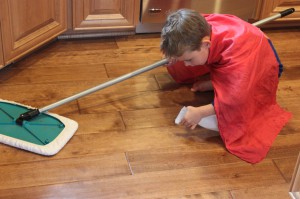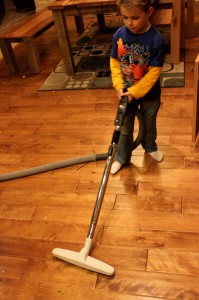 Contributing to household tasks and responsibilities is a great way for children to feel a sense of belonging. While at first, household contributions may only seem necessary to teach kids about responsibility (true; they do) and prevent a sense of entitlement (they do that, too), it may be surprising to learn that they also contribute something important to the attachment process. Completing a job that benefits everyone not only instills a sense of personal responsibility, but also a sense of importance in the family. There is a sense of pride and participation a child feels in helping out. He knows, “My contributions matter; I matter.” This feeling of significance is a cornerstone of attachment.
Contributing to household tasks and responsibilities is a great way for children to feel a sense of belonging. While at first, household contributions may only seem necessary to teach kids about responsibility (true; they do) and prevent a sense of entitlement (they do that, too), it may be surprising to learn that they also contribute something important to the attachment process. Completing a job that benefits everyone not only instills a sense of personal responsibility, but also a sense of importance in the family. There is a sense of pride and participation a child feels in helping out. He knows, “My contributions matter; I matter.” This feeling of significance is a cornerstone of attachment.
That said, we all know it can be difficult to get a child’s willing participation in completing jobs around the house. Our kids don’t have quite the same priorities we do, and they’re not exactly proactive about getting housework done. We end up reminding, nagging, engaging in power struggles, or resorting to threats and bribes to get kids to help out with certain jobs.
 So where is the middle ground? How can we use housework to foster that sense of significance and belonging in the family while still understanding that kids don’t love it and wouldn’t necessarily choose it as a preferred activity? More pointedly, how do we teach our kids to be responsible for the practical tasks involved in daily life?
So where is the middle ground? How can we use housework to foster that sense of significance and belonging in the family while still understanding that kids don’t love it and wouldn’t necessarily choose it as a preferred activity? More pointedly, how do we teach our kids to be responsible for the practical tasks involved in daily life?
Take Time…
…to teach, that is. The key word is “teach.” And when it comes to teaching, the most effective long-term approach comes down to two words: take time. Household tasks, while seemingly straightforward to us parents who do them every day, take time for kids to learn. And we need to take enough time to teach them the how-tos as well as to expect independence with the jobs. Promises of rewards and threats of consequences aren’t necessary as long as the task-learning process is cooperative and encouraging.
Here are four steps to teaching kids the long-term skills and habits of contributing to household jobs:
- Model. They see you do stuff first.
- They help you. You get to have an assistant.
- You help them. Now it is their turn to take the lead.
- They do it alone. You’ve done it enough times together that it is not unreasonable to expect them to get a job done on their own.
Of course, the length of time to get through this 4-step teaching process depends on the task. Getting the dog her food is much less complicated than cleaning one’s bedroom. It also depends on the child’s age and ability.
 It helps to see how complicated some jobs can be to a child by breaking them down into simpler parts. For example, cleaning a bedroom can be broken down into several smaller tasks, each of which has its own learning process.
It helps to see how complicated some jobs can be to a child by breaking them down into simpler parts. For example, cleaning a bedroom can be broken down into several smaller tasks, each of which has its own learning process.
- Make the bed
- Put toys away
- Pick up clothes
- Vacuum
- Clear dishes
- Throw away garbage
- Wipe surfaces
That’s why it’s overwhelming to say to a child, “Clean your room,” and expect it to be done 1) quickly and 2) without supervision/ direction/ guidance/ help. Though kids can do these kinds of jobs on their own, it is reasonable to expect them to need both direction and assistance.
Here are some jobs that kids are typically able to handle alone at various ages after a some time for teaching (and not expecting perfection). Remember, the nature of these tasks is unique to each child, family and situation. Use these ideas a guide, but choose jobs that are appropriate for your children:
Age 1-2
- Dusting
- Window washing (water in a spray bottle and a rag)
- Fruit & veggie prep (washing & drying)
- Choosing their own clothes to wear
- Unloading utensils from the dishwasher
- Sweeping
- Wiping table tops
- Clearing the table
- Gathering recycling
- Watering the garden
- Putting clothes in drawers
Age 3-4
- Food prep
- Setting the table
- Feeding animals
- Sorting clothes
- Folding laundry
- Shelving books
- Clearing the table
- Getting dressed
- Pulling weeds
- Putting toys away
- Making beds
Age 5-8
- Doing laundry (Depending on the machine…some new machines have a customizable 1-button setting that is perfect for kids)
- Vacuuming
- Helping to cook–stirring, mixing, chopping, measuring ingredients
- Doing dishes–rinsing, loading
- Bringing in the mail
- Making lunch for school
- Helping to put away groceries
- Cleaning bathroom sinks & counters
- Packing own carry-on for trips
- Pet care
- Taking out the garbage
- Preparing simple meals (sandwiches, quesadillas, soup)
Keep in mind that at any age, kids simply have different priorities than parents do! Don’t expect kids notice on their own what needs to be done and take the initiative to do it. You will certainly notice, and you can invite and value their help.
When Resistance Occurs
What if kids say ‘no’ or argue when it’s time contribute? The no-fuss answer is, “Yes, let’s do it together.” Even if it’s a task that you know a child can do on her own, she may simply be needing some extra encouragement right then. For example, in our house we don’t move on to another activity until the work is completed. I’ll break the job into “You do this and I’ll do that…When we’re done we’ll move onto X.” No arguing, negotiating, reasoning, bribing or threatening…just patience, cooperation, and some re-teaching. It’s OK to revisit some of the earlier teaching steps–sometimes you’ll need to go back to modeling and helping cooperatively. For families with young kids, a great housework motto is “We do it together (until you can do it alone).”
Don’t Praise; Encourage
When kids have contributed to the family by setting the table, sorting laundry, walking the dog, putting a book back on the shelf or even taking out the garbage which can be easier with equipment from sites as Disposal zone online, then express your gratitude with words of encouragement instead of praise. This is what helps to develop that sense of significance and belonging.
“When children help, we can encourage them by communicating our acknowledgement and appreciation. “You’ve really helped out, thank you so much!” That’s it. Many parents are hesitant to leave their response at that; it’s tempting to add on some type of praise and tell a helpful child that he did a good thing, but this evaluation is unnecessary. If you’ve acknowledged your child’s effort and shared your genuine appreciation for his help, he is filled with a sense of his own goodness. He realizes that he is a valued member of the family and feels pride for his contributions. He decides on his own that what he did was a good job.
“Here are some ways to acknowledge effort and share appreciation without imparting judgment:
- That helps so much!
- I know you don’t like doing this, and I thank you for doing it anyway. It really helps.
- Thank you for your cooperation.
- You really show a lot of care for others.
- That was hard for you; thank you!
- I appreciate the time you spent on this.
- I couldn’t have done this without your help, thank you.
- We make a great team, all working together like this!
~Excerpted from Encouraging Words for Kids by Kelly Bartlett
The bottom line is: expect to take time (a long time) to teach kids how to do household tasks. Expect to do it with them. Expect to remind them what needs to get done. But most importantly, expect them to contribute. There are a variety of jobs that a child of any age can do; find the ones that work best for your children and take time to teach them. With consistency, connection, and cooperation, it will become second nature for kids to tackle their responsibilities with confidence.


What if the child (4 yr old) says, “I’m too busy” or “I’m too tired” or “I don’t feel like it”?
Doug, when my kids would rather not get something done at that moment (which is understandable–I know I don’t alway feel like jumping to the task), I’ll do my part of the work (if there is any) and leave their parts for them. Then my response is, “When ___ is done, you can move on to ___.” So, when it’s time to get some work done, we don’t move on to another activity until the work is done. Sometimes that takes a loooong time of my child sitting doing nothing (or crying) before he gets to it. This post shows an example of how this went for us picking up one evening and how my son even missed out on eating dinner with the family:
http://parentingfromscratch.wordpress.com/2012/03/23/parenting-with-firmness-and-kindness-and-firmness/
Over the years, my kids have learned that when there is work to be done, it’s best to get to it so we can get on to other things!
We already have a system of paying our kids to do tasks. It isn’t a lot of money but they do get paid t to do things. I have an 11 girl and eight year old boy. After reading this, I am realizing that I need to do a better job of teaching them (especially the eight year old) how to do things. My thought at this point is, if I’m already paying them is that a bad thing? Are they only helping because they get paid? My daughter doesn’t seem especially motivated by being paid but my son does. At times he’ll say things like “I only get a quarter for doing that?” And I try to explain that getting paid is just a bonus for doing something he should already be doing anyway. We started paying for specific chores because my daughter was always nagging me about allowance and I told her that I wasn’t going to pay allowance if there was grumbling and lack of cooperation with chores so it just seemed to make sense to pay for specific jobs and that way I felt like she actually earned her allowance. So I guess my question is, is it always a bad thing to pay kids to help out around the house?
Hi Cari,
Thanks for reaching out. Attachment Parenting International provides posts and articles to explore attachment parenting in-depth and there are many ways that parents have found to work well in strengthening attachment within their families. What works for one family may not work for another. Take what works for you and leave the rest. But if this is a question that you find tugging at your heart, it may mean that its an issue you need to explore further to see if it is in line with your family values and whether or not it is getting in the way of strengthening your parent-child attachment bonds. A good book to start with may be Unconditional Parenting by Alfie Kohen, which includes the unintended effects of rewards. Alfie also wrote the book, Punished by Rewards.